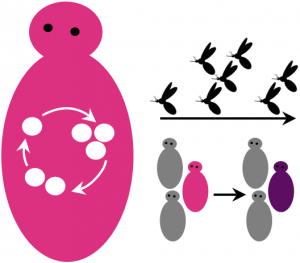
The Greischar Lab is part of the Department of Ecology & Evolutionary Biology at Cornell University. We use models to study why parasites use such diverse strategies to make a living within a host, including:
1. Why do some malaria infections replicate synchronously in the blood and occasionally cause periodic fevers? If synchrony is beneficial, then why aren’t all infections synchronous? Will synchronous and asynchronous parasites respond differently to drug treatment both in the short term and through evolutionary time?
2. Mosquitoes transmit human malaria all too efficiently, but that doesn’t mean they are ideal vectors. Mosquitoes are fragile and short-lived, and their numbers can fluctuate substantially over the course of a transmission season. How do malaria parasites alter their strategies within the host to cope with this uncertainty and what could that mean for human health?
3. Malaria parasites can respond plastically to ecology within the host, but what cues exactly do they respond to? I use time series data from malaria infections to understand exactly what cues parasites respond to and whether they are likely to respond adaptively to novel changes in their environment (e.g., drug treatment).
4. Why don’t parasites replicate faster? Malaria parasites exhibit huge variation in how fast they proliferate, suggesting that for many species, it might be possible to replicate faster. Is it only a matter of time until slow-growing parasites evolve faster multiplication rates?